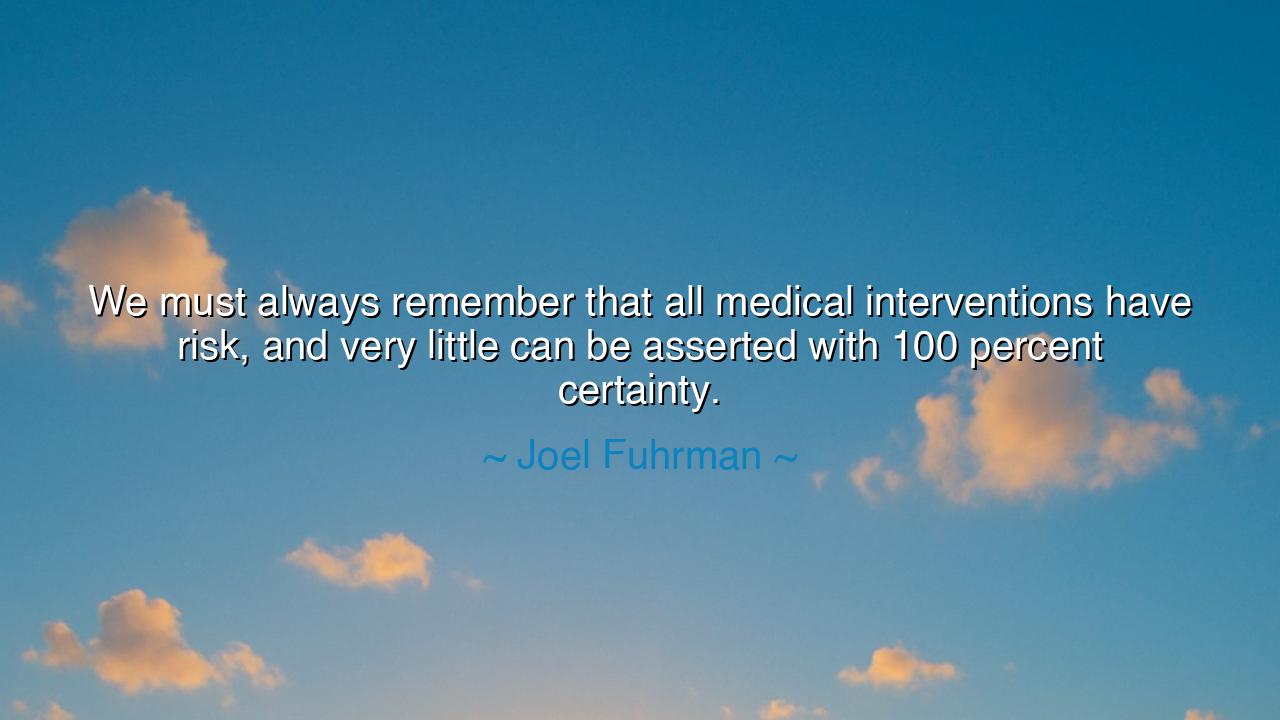
We must always remember that all medical interventions have risk
We must always remember that all medical interventions have risk, and very little can be asserted with 100 percent certainty.






When Joel Fuhrman declared, “We must always remember that all medical interventions have risk, and very little can be asserted with 100 percent certainty,” he spoke with the voice of caution and humility, a reminder that even in the halls of science, human beings walk not in perfect light but in partial shadow. His words carry the weight of wisdom gathered over centuries of healing and error, triumph and tragedy, discovery and doubt. For medicine is not magic, nor are its practitioners gods; it is a noble craft guided by knowledge, yet always subject to the frailty of human understanding.
The first truth he names is that all medical interventions carry risk. To pierce the body with a surgeon’s knife is to wound in the hope of healing. To swallow medicine is to invite not only its cure but also its side effects. Even the gentlest treatment alters the body, and every alteration may bring unintended consequence. The ancients knew this well—Hippocrates himself warned, “First, do no harm.” But Fuhrman reminds us that harm cannot always be avoided, only weighed, balanced, and approached with humility.
The second truth is that certainty is rare. In an age intoxicated by technology and data, many imagine that science can guarantee outcomes with absolute assurance. Yet the human body is vast, complex, and mysterious. Two patients may receive the same treatment, and one will rise while the other falls. Diseases shift, mutate, and defy prediction. What was once thought truth in medicine—such as the bleeding of patients to balance “humors”—is now remembered as error. Fuhrman’s words remind us that to be wise is not to claim certainty, but to embrace the limits of knowledge.
History offers us many examples. Consider the tale of Ignaz Semmelweis, who discovered that hand-washing could save mothers from fever and death. His colleagues, certain of their own practices, rejected him. They could not accept that their hands carried death into the birthing room. Their false certainty killed thousands. Or recall the discovery of penicillin, a miracle drug that healed countless lives, yet today is shadowed by the rise of resistant bacteria—reminding us again that every cure carries its peril. These stories reveal the eternal truth in Fuhrman’s warning: medicine must be guided by caution, never arrogance.
The deeper meaning of his words lies in the call for humility. Patients must not demand certainty where none exists, and physicians must not promise what they cannot deliver. Instead, there must be honesty, compassion, and the courage to admit uncertainty. This humility does not weaken medicine; it strengthens it, for it grounds the healer in truth rather than illusion. To acknowledge risk is to treat patients not as numbers, but as souls whose lives deserve reverence.
For us, the lesson is clear: in every choice, whether medical or otherwise, weigh the risks honestly. Do not seek the impossible dream of perfect safety, nor be paralyzed by fear of harm. Instead, walk with open eyes, accepting that life itself is fragile, and that wisdom lies in balance, not in certainty. Just as the sailor trusts his ship while still respecting the sea, so too must we trust medicine while respecting its limits.
Practical wisdom follows: when you or those you love face medical decisions, ask not only of the promise, but also of the risk. Demand honesty, not guarantees. Be informed, be cautious, but do not despair—for though certainty is rare, progress is real, and countless lives are saved each day by interventions once thought impossible. Remember also that health is not only preserved by medicine, but by living wisely: through nourishment, rest, exercise, and balance.
Thus, Fuhrman’s words endure as a beacon. Risk, uncertainty, humility—these are not enemies of medicine, but its foundation. Let us remember them always, so that we may walk the path of healing with wisdom, gratitude, and respect for the fragile miracle of life. For certainty is the language of arrogance, but humility is the language of truth—and truth alone can guide us toward healing.






AAdministratorAdministrator
Welcome, honored guests. Please leave a comment, we will respond soon